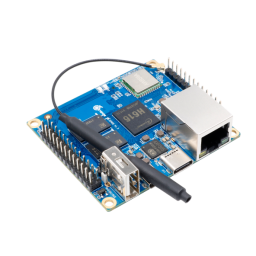NixOS on ARM/Orange Pi Zero2 H616
| Orange Pi Zero2 (H616) | |
|---|---|

| |
| Manufacturer | Xunlong / Orange Pi |
| Architecture | AArch64 |
| Bootloader | Upstream u-boot[1] |
| Maintainer | Ein-shved |
Status
Upstream unstable NixOS AArch64 image will boot on the Orange Pi Zero2 (H616), using the proper upstream u-boot.
The limited support of allwiner H616 soc was introduced to the Linux upstream kernel since 6.0 version, see periphery for details.
Board-specific installation notes
Fastest way
First follow the generic installation steps to get the installer image on an SD card.
U-Boot needs to be copied to specific sectors on the microSD card with dd. Download u-boot for the board, and copy it to the correct location with (again, replace /dev/sdX with the correct path to the SD card device):
sudo dd if=u-boot-sunxi-with-spl.bin of=/dev/sdX bs=1024 seek=8
Then, install using the installation and configuration steps.
Better way
To get the more useful output from board better to build image with kernel which supports more periphery (like USB). See periphery.
Serial console
The default console configuration from sd-image-aarch64 works out of the box.
Ethernet
Connected at 1Gbps mode.
Periphery
Current newest numerated kernel version 6.1 does not contains full H616 sock support. At least some regulators and USB blocks are missing in DTS. But they are available in master branch.
Here is flake with which an image with better periphery support (at least - USB) may be build.
{
description = "Build image for OrangePi Zero 2";
inputs = {
nixpkgs.url = github:nixos/nixpkgs/nixos-22.11;
};
outputs = { self, nixpkgs }: let
system = "aarch64-linux";
#Build manipulation
stateVersion = "22.11"; # NixOS Version
useUnstableKernel = true; # Set to false to use mainline kernel
compressImage = true; # Set to false to disable image compressing
pkgs = nixpkgs.legacyPackages.x86_64-linux.pkgsCross.aarch64-multiplatform;
# Build unstable kernel
kernel =
with pkgs;
with lib;
buildLinux rec {
kernelPatches = [
linuxKernel.kernelPatches.bridge_stp_helper
linuxKernel.kernelPatches.request_key_helper
];
src = fetchGit {
url = git://git.kernel.org/pub/scm/linux/kernel/git/torvalds/linux.git;
rev = "8395ae05cb5a2e31d36106e8c85efa11cda849be";
};
version = "6.1.0";
modDirVersion = version;
extraMeta.branch = versions.majorMinor version;
};
# Boot related configuration
bootConfig = let
bootloaderPackage = pkgs.ubootOrangePiZero2;
bootloaderSubpath = "/u-boot-sunxi-with-spl.bin";
# Disable ZFS support to prevent problems with fresh kernels.
filesystems = pkgs.lib.mkForce [ "btrfs" "reiserfs" "vfat" "f2fs" "xfs"
"ntfs" "cifs" /* "zfs" */ "ext4" "vfat"
];
in {
system.stateVersion = stateVersion;
boot.kernelPackages = if useUnstableKernel
then pkgs.linuxPackagesFor kernel
else pkgs.linuxPackages_latest;
boot.supportedFilesystems = filesystems;
boot.initrd.supportedFilesystems = filesystems;
sdImage = {
postBuildCommands = ''
# Emplace bootloader to specific place in firmware file
dd if=${bootloaderPackage}${bootloaderSubpath} of=$img \
bs=8 seek=1024 \
conv=notrunc # prevent truncation of image
'';
inherit compressImage;
};
};
# NixOS configuration
nixosSystem = nixpkgs.lib.nixosSystem rec {
inherit system;
modules = [
# Default aarch64 SOC System
"${nixpkgs}/nixos/modules/installer/sd-card/sd-image-aarch64.nix"
# Minimal configuration
"${nixpkgs}/nixos/modules/profiles/minimal.nix"
{ config = bootConfig; }
# Put your configuration here. e.g. ./configuration.nix
];
};
in {
inherit system;
# Run nix build .#images.orangePiZero2 to build image.
images = {
orangePiZero2 = nixosSystem.config.system.build.sdImage;
};
};
}
USB
The suggested master kernel supports only the onboard usb ports (not sure about USB type-C). If you want to use extension board or D+/D- pins, you need to add dts overlay to enable ehci and ohci ports. Just enable them all, putting this to configuration:
hardware.deviceTree = {
enable = true;
filter = "sun50i-h616-orangepi-zero2.dtb";
overlays = [
{
name = "sun50i-h616-orangepi-zero2.dtb";
dtsText = ''
/dts-v1/;
/plugin/;
/ {
compatible = "xunlong,orangepi-zero2", "allwinner,sun50i-h616";
};
&ehci0 {
status = "okay";
};
&ehci1 {
status = "okay";
};
&ehci2 {
status = "okay";
};
&ehci3 {
status = "okay";
};
&ohci0 {
status = "okay";
};
&ohci1 {
status = "okay";
};
&ohci2 {
status = "okay";
};
&ohci3 {
status = "okay";
};
'';
}
];
};
WiFi
According to SOC dts, Wi-Fi does not supported yet in mainline.
HDMI
According to SOC dts, HDMI does not supported yet in mainline.